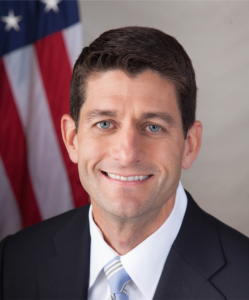
Representative Paul Ryan (R-WI 1st) has been elected Speaker of the U.S. House of Representatives. Ryan was first elected to Congress in 1998 and is serving his ninth term. He also stood in 2012 as the vice presidential running-mate to former Governor Mitt Romney (R-MA), the unsuccessful Republican nominee for president.
Ryan received 236 votes, a solid majority of the 432 votes cast. Representative Nancy Pelosi (D-CA 12th), the House Minority Leader, received 184 and Representative Daniel Webster (R-FL 10th) received nine. Three representatives voted for other candidates.
The outgoing speaker is Representative John Boehner (R-OH 8th), who made a surprise announcement in September that he would be retiring from Congress at the end of this month. Boehner presided over a Republican Party in turmoil, splintered between old-guard ‘big government’ insiders and a resurgent wave of fiscal and social conservatives.
Ryan initially did not seek election as speaker, and explicitly stated that he would not be a candidate. Then, following Representative Kevin McCarthy’s (R-CA 23rd) surprise withdrawal from candidacy, many party insiders began floating Ryan as a potentially unifying replacement candidate. On October 20, Ryan informed fellow Republicans that he would run, but only if three key groups of Republicans supported him, including the conservative Freedom Caucus that often butted-heads with Boehner. On October 22, following endorsements (formal or informal) from those groups, he entered the race.
It is unclear if Ryan will be more successful than Boehner in finding areas of agreement and compromise. In addition to a hard-line taken by many conservative Republicans in opposition to the old-guard, the Democratic Party has also shifted strongly toward stubborn intransigence, particularly with regard to budgeting and spending.
The speaker of the house falls immediately after the vice president in the line of presidential succession.

